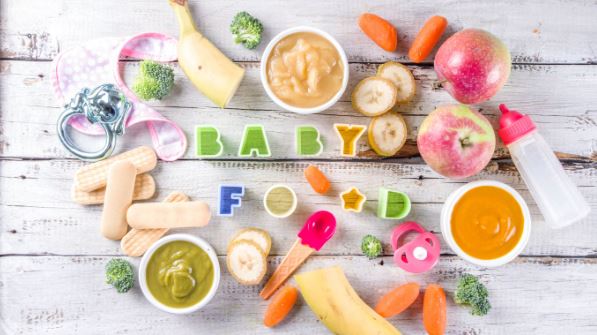Many people believe that children cannot like vegetables in general. Unfortunately, this stereotype creates problems at the beginning of the journey, most of the time, when the baby is just getting to know different products.
Young parents often think that children should be convinced to like vegetables or that they need to be motivated or persuaded to make it happen. As a matter of fact, the main thing parents can do is not prevent the child from getting acquainted with vegetables and finding the ones the baby likes. Let’s find out more about how to do so.
How to introduce a baby to its first weaning?
Depending on the individual development of a baby, breastfeeding or formula feeding cannot be enough after the age of 6 months. Nutrition scientists recommend expanding a baby’s diet from this age and introducing new food. Moreover, if breastfeeding is not available for the baby, parents should be well aware that there are different formulas for different ages. Let’s have a look at the formula stages with the help of the brand HiPP. Stage PRE and Stage 1 are suitable from birth. After the age of 6 months, the baby needs different nutrients for growth and development. That is why parents need to switch their baby’s formula to Stage 2. It is better to use Stage 1+ starting from one year. After 1 year, children are grown enough and can eat some solids, porridges, cereals, and so on. So, is toddler formula recommended alongside weaning? The toddler can not eat a broad amount of solid food which will provide the necessary nutrients. So, it is better to continue bottle feeding or breastfeeding together with the weaning.
Baby’s first weaning: Start with vegetables
Do not rush to add fruits to the baby’s diet. It is better to offer different variants of vegetables. Try to keep in mind the rule that children need time and a few attempts to feel a new taste. If some vegetable does not work for your baby right away, be ready to offer it again in three or four days and do so a few times in a row. It is essential for the baby to clearly learn to recognize the new taste and decide whether to like it or not.
How to get your toddler to eat vegetables?
Toddlers can be very picky. Here are some pieces of advice to present vegetables to your baby.
- Start with a small. Gradualness is very important in the introduction of new products into the baby’s diet. Start with a small amount of vegetables and add them to the meal your baby knows and likes. For example, you can add some boiled carrots or broccoli to baby’s favorite porridge.
- Be an example. Toddlers like to imitate the behavior of adults. Show your example to the baby that vegetables are tasty and useful. Eat them together, and comment on their taste and properties.
- Keep vegetables in sight and introduce them to the child in their natural form. Let vegetables always be an available snack. Small reusable zip bags or containers with tight lids can help to keep vegetables fresh. As soon as the child learns to take a bite from a large piece, it is better to stop cutting vegetables into small cubes or sticks.
- Suggest vegetables foremost. When the baby is hungry, before giving a main meal, suggest a small vegetable snack. For example, it can be slices of vegetables. This will not spoil the appetite, but the child will receive a daily fiber portion.
- Do not force a baby to eat vegetables. Do not put the child before the choice to eat or not to eat vegetables. Coercion can only push the baby away from new products. Instead, create a comfortable atmosphere where the baby would want to calmly learn and try new flavors.
- Try different ways of cooking. You can cook vegetables in different ways, like boiling, stewing, or baking them. Try to vary the cooking methods. This can change the texture and taste of different vegetables.
Conclusion
Remember, your baby is unique. That is why the process of introducing vegetables into the diet can take a while for different children. Use the insights and recommendations and create positive associations with eating vegetables. As a result, it will help your toddler to develop healthy nutritional habits.

